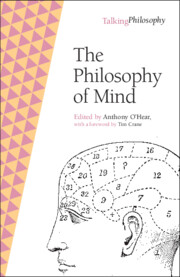Book contents
- The Philosophy of Mind
- Talking Philosophy
- The Philosophy of Mind
- Copyright page
- Contents
- Foreword
- List of Contributors
- Introduction
- The Mind–Body Problem after Fifty Years
- How to Find the Neural Correlate of Consciousness
- Embodiment and the Philosophy of Mind
- Folk Psychology and Mental Simulation
- Understanding Other Minds from the Inside
- Self-knowledge: the Wittgensteinian Legacy
- Joint Attention and the First Person
- Consciousness as Existence
- Setting Things before the Mind
- Perceptual Intentionality, Attention and Consciousness
- Experience and Reason in Perception
- Intentionality as the Mark of the Mental
- Intentionality and Interpretation
- Externalism and Norms
- Mind, World and Value
- Mind, Knowledge and Reality: Themes from Kant
- The Modality of Freedom
- Dualism in Action
- Index
Joint Attention and the First Person
Published online by Cambridge University Press: 19 May 2022
- The Philosophy of Mind
- Talking Philosophy
- The Philosophy of Mind
- Copyright page
- Contents
- Foreword
- List of Contributors
- Introduction
- The Mind–Body Problem after Fifty Years
- How to Find the Neural Correlate of Consciousness
- Embodiment and the Philosophy of Mind
- Folk Psychology and Mental Simulation
- Understanding Other Minds from the Inside
- Self-knowledge: the Wittgensteinian Legacy
- Joint Attention and the First Person
- Consciousness as Existence
- Setting Things before the Mind
- Perceptual Intentionality, Attention and Consciousness
- Experience and Reason in Perception
- Intentionality as the Mark of the Mental
- Intentionality and Interpretation
- Externalism and Norms
- Mind, World and Value
- Mind, Knowledge and Reality: Themes from Kant
- The Modality of Freedom
- Dualism in Action
- Index
Summary
It is sometimes said that ordinary linguistic exchange, in ordinary conversation, is a matter of securing and sustaining joint attention. The minimal condition for the success of the conversation is that the participants should be attending to the same things. So the psychologist Michael Tomasello writes, ‘I take it as axiomatic that when humans use language to communicate referentially they are attempting to manipulate the attention of another person or persons.’ I think that this is an extremely fertile approach to philosophical problems about meaning and reference, and in this paper I want to apply it to the case of the first person. So I want to look at the case in which you tell me something about yourself, using the first person, and we achieve joint attention to the same object. But I begin with some remarks about how this approach applies to proper names and to perceptual demonstratives.
- Type
- Chapter
- Information
- The Philosophy of Mind , pp. 192 - 213Publisher: Cambridge University PressPrint publication year: 2022

